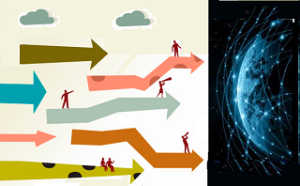
Arquivo para February 22nd, 2018
Sociocibercultures and Paradise Lost
The idea of Lost paradise is our Adamic archetype, at least of the Western religions, they came to relate to religions in the dual relation of modernity, proposed by Kant and consecrated and idolized by Hegel in establishing his “state” ethics in the discussions about family, civil society and the state itself, being included as a greater totality.
to relate to religions in the dual relation of modernity, proposed by Kant and consecrated and idolized by Hegel in establishing his “state” ethics in the discussions about family, civil society and the state itself, being included as a greater totality.
It is in this tension that Niklas Luhmann’s communicative dualism fits in, for example, for whom internal communication (in the sociociberculture to the individual), which regulates and restricts it at the same time with the communication to its environment (the socio-cultural environment) is in Luhmann’s text “Soziale Systeme” (1984).
It is, to a certain extent, Sloterdijk’s immunology, by asserting that immune systems are “based on the distinction between self and the alien,” but rejects any idea of a stranger present in religions, which for him “do not exist,” then the mystery of life and of truth are no longer conditions of ‘transcendence’, of possibility of paradise.
It is happy to relate the biological to the social organism and in this sense the biological organism is identified as the one that life defense processes “defend”, and also identifies the growing concentric circles as having a cooperative and convivial dimension.
However, in recognizing the intergenerational symbolic plane in which individual death occurs, in spite of stabilizing the world image in new generations, it is not able to see the solidity and truth present in a life beyond life, in a nature beyond nature, supernatural.
In this plan that I place the noosphere, there is a communication beyond the symbols present in the daily life of the spiritual life and in it perpetuates the “eternal” life, not only between generations, but in the realization in a “noospheric” .
Selfish generations unable to think of the future generation do not destroy nature alone, destroy environmental conditions for the future to take place in the form of full life, make the pessimism of their personal life “to death” (by age) in a false social death.
The lost paradise is the inability to give happiness and peace to future generations, it is to repeat how to make the sick spheres of society “everything will be worse”, and those who were born in a society already in crisis, made by past generations, feel “guilty” of the world today.
The lost paradise is the impossibility of future, true to the individual life of adults who tend to end of life, but false to the body only.

